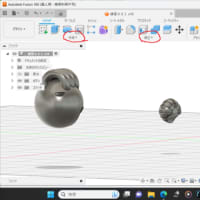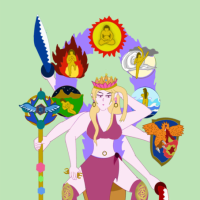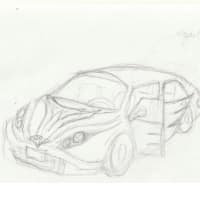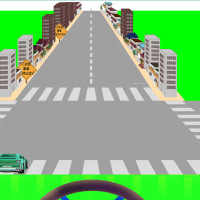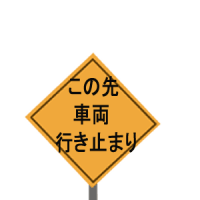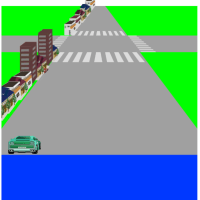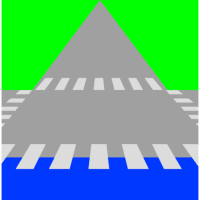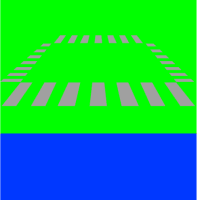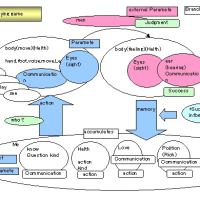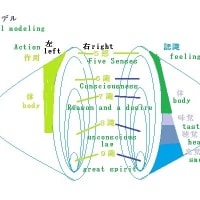Ⅳ.罰するルール。Ⅳ. Rule to punish.
1) There are four types of punishment: general punishment, another punishment, hidden punishment (meibachi), and punishment that appears.
(1)General punishment is punishment given by nature (punishment given by God). There are natural disasters and epidemics.
(2) The other punishment is the punishment received by the individual. It also depends on the crime of past lodging.
(3) The hidden punishment is the punishment of the mind (received by the brain).
(4) The punishment that appears is painful punishment (received by the body).
1)罰に四つあり、総罰、別罰、潜伏する罰(冥罰:めいばち)、顕われる罰(顕罰)。
(1)総罰は、自然が与える罰(神が与える罰)。自然災害、疫病等がある。
(2)別罰は、個人に受ける罰。宿(やど)る罪(過去の行動)にもよるもの。
(3)潜伏する罰は、精神に受ける罰(脳に受ける)。
(4)顕れる罰は、痛みを伴う罰(肉体に受ける)。
2) The reason that a person made a law instead of God and punished a sinner was to suppress sin (for liquidation).
(1) In ancient times, physical settlement was the basis. Nowadays money and time are used to pay for the value of life.
(2) Equivalent rules of crime and punishment.
・If you lose your arm, cut off your opponent's arm. Today, we don't do that. But in the post-mortem world, the punishment is obvious.
(3) Judgment of crime.
・Judge the crime in a court. This is not the person who is absolutely. Therefore, it is to give a margin to correct human error. From the perspective of God and Buddha, it is already clear if there is sin.
(4) Punishment of those who are determined to be evil. (Exposure of sin by knowing.)
・If you do not think it is evil, you will not feel guilty. However, the victims are clearly suffering. Punishment begins when you know (or admit) the suffering of the person after or at the present time.
2)人が神に代わりに律法を作り罪人に罰を与えたのは、罪の抑制の為(清算の為)である。
(1)古代は、肉体的な清算が基本であった。現在では、お金と時間で命の価値を償う。
(2)罪と罰の等価の法則。
・腕を失わせれば、相手の腕を切り落とす。現代では、そういうことはしない。しかし、死後の世界では、その罰は、歴然と存在する。
(3)罪の判定。
・裁判で罪を判定する。これは、人は絶対ではない。よって、人の誤りを訂正する余地を与えるためである。神様や仏様にしてみれば、罪があるかは既に明白である。
(4)悪に決定している者の罰。(知ることによる罪の発露。)
・悪と思わなければ、罪の意識を感じない。しかし、被害をうけた者は、歴然と苦しんでいる。死後または、現在に、あなたがその人の苦しみを知れば(認めれば)罰は始まる。
3) The cause is the behavior (spiritual distortion) that is involved in committing sin.
(1) Sin is a manifestation of the cause of the mind, and punishment is a manifestation of the cause of sin.
(2) Kind of sin.
・Crime given to nature (environmental destruction). Crimes given to society (social harm, pollution). Sin (disability) given to an individual.
・The crime described on the left is heavy.
(3) Types of punishment.
・Pain punishment (self-harm). Body punishment (plague). Punishment of mind (suffering, instability)). Brain punishment (anxiety, fear).
(4) The crime of the couple.
・It is a crime of the couple. If the couple approve, they should divorce. You should also be financially responsible.
・Details will be described in the chapter of “VI. Marriage rules”.
3)罪を犯すのも宿業(精神の歪み)が原因。
(1)罪は、心の因の現れであり、罰は、罪の因の現れである。
(2)罪の種類。
・自然に与える罪(環境破壊)。社会に与える罪(社会害、公害)。個人に与える罪(障害)。
・左側に記述した罪が重いです。
(3)罰の種類。
・痛みの罰(自傷)。体の罰(疫病)。心の罰(苦しみ、不安定))。脳の罰(不安、恐怖)。
(4)夫婦の罪。
・両者の罪です。両者で認めれば離婚すべきです。経済的責任も負うべきです。
・詳しくは、「Ⅵ.結婚のルール」の章でも述べます。
4) Punishment dedicated to God.
・Personal punishment so that total punishment does not occur.
・In ancient times, it was, but not in the present.
・There is a clear crime.
・God does not forgive.
4)神に捧げる罰。
・総罰が起こらないように、あえて個人に与える罰。
・古代では、有ったが現代ではない。
・歴然と罪はある。
・神は許さない。
5) Rules that God punishes.
・Total punishment. Punishment given by nature. (Natural disasters, epidemics, etc.)
・It has a certain amount of margin, but once it begins to happen, it cannot be stopped.
・God punishes because it does not punish in society.
・Individuals have no choice but to expand their faith. There is no choice but to fight without allowing evil.
5)神様が罰するルール。
・総罰。自然が与える罰。(自然災害、疫病等。)
・それには一定の有余があるが、起こり始めると止めようがない。
・社会で罰しないから神が罰する。
・個人では、正しい信仰心を広げるしかない。悪を許さずに戦うしかない。
6) The rule that Buddha punishes.
(1) Penalty for breaking the head. Punishment of relations.
・Writing this in "Rules of the Buddha," but accepts anything that has a "tie of blood and flesh and bones."
・"Penalty for breaking the head" is a betrayal of one's own "flesh and bones" (relation).
・The punishment of the brain. Your thoughts are confusing and you feel uneasy and you feel sick.
・You will receive the "punishment of relation" on your body. If a person with blood ties becomes sick, your body becomes sick.
6)仏様が罰するルール。
(1)頭破の罰。リレーションの罰。
・これを、「仏様のルール」で書くが「血と肉骨の縁」を持つものは全て受ける。
・「頭破の罰」とは、自身の「肉や骨」(リレーション)を裏切る罰です。
・脳に受ける罰。あなたの思考が錯綜うし不安に感じで気分が悪くなる。
・「リレーションの罰」は、体にも受ける。血の縁を結んだ人が病気になれば、あなたの体は病気に成る。
7) Rules of punishment by teachers (those who serve faith).
・Type of punishment determined by religion. There are punishments in the world of education. Punishment should be clearly defined in both religion and education. The missing parts of society should be supplemented.
7)教師(信仰に仕える者)がする罰のルール。
・宗教が決める罰の種類。教育の世界でも罰がある。宗教でも教育でも罰を定め明示するべきである。社会で足らない部分は補うべきである。
8) Rules that the law punishes.
・A law should be established in the world for harm to nature and society.
・We support the United Nations initiative.
8)律法が罰するルール。
・自然や社会に対する害を世界で律法を確立すべきです。
・国連主導を支持します。
9) Rules for eliminating crime.
・If there is no reason, you will not be punished.
・Produce sin. Get guilty. Cause of the heart.
・You sin. You are guilty. Cause of the heart.
・Pray until it is time for you to resolve the problem, until your mind is organized.
・For those who do not feel guilty, help the principal object to recreate the sins (sense and memory of the victim).
9)罪の解消のルール。
・因がなければ、罰を受けない。
・あなたが罪を犯す。あなたが罪を受ける。心の因。
・自身で解消する時間まで、心の整理がつくまで祈ることです。
・罪を感じない人には、御本尊に力を借り、罪(被害者の感覚や記憶)の再現を起こす。
10) The work of "God of Death, Buddha of Death".
(1) God of death.
・God who controls death. Become a Bodhisattva. Control life and death to help people.
(2) The demon of illness.
・The illness virus is stored in his body. He sends the disease according to your cause. Become a Bodhisattva.
(3) Buddha of things.
・He erases things. Sea plankton and bodhisattva. Plankton is born a fairy.
(4) The doll Buddha.
・He summons a doll. Some sinners become dolls.
(5) Devil.
・He becomes a Bodhisattva and apologizes for the crime.
(6) Residents of the underworld.
-He takes a man who has sinned and died to a dead country. He drops you into the endless hell of the victim's memory.
10)「死の神仏」の働き。
(1)死の神。
・生死を司る神。菩薩となる。人を助けるために生と死をコントロールする。
(2)病の魔。
・病のウィルスを彼の身に宿す。彼はあなたの因に従い病を送る。菩薩になる。
(3)物の仏。
・彼は物を消去する。海のプランクトンや菩薩。プランクトンは妖精に生まれる。
(4)人形の仏。
・彼は人形を召喚する。罪ある者の中に人形に成る者あり。
(5)悪魔。
・彼は菩薩に成り、罪を諫める。
(6)冥途の国の住人。
・罪を犯して死んだ人を冥途の国に連れていく。彼はあなたを被害者の記憶の無間地獄に落とす。
that's all.
以上。










